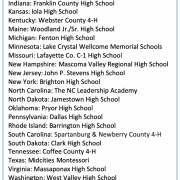Fraud trends: Bogus Internet sales remain most-reported fraud for fifth year in a row; Fake check, phishing scams making a comeback
February 1, 2018
Contact: NCL Communications, Carol McKay carolm@nclnet.org, (202) 207-2831
Washington, DC—The National Consumers League (NCL), the nation’s pioneering consumer advocacy organization, has released its annual compilation of the top ten scams reported to Fraud.org, NCL’s flagship project for fraud prevention and education. Based on an analysis of nearly 5,000 fraud complaints submitted by consumers to Fraud.org in 2017, NCL is warning consumers to beware Internet merchandise sales scams.
For the fifth year in a row, Internet merchandise scams topped the list of complaints reported to Fraud.org. The way many consumers first come into contact with these scams is via a “too good to be true” ad on a website, social media platform, or Internet forum. Popular ways scammers catch consumers’ eyes is with deep discounts on goods like iPhones, sneakers, luxury apparel, video game systems and even pets.
“The convenience of online shopping is simply unbeatable for many consumers,” said John Breyault, who directs Fraud.org. “Obviously there are plenty of legitimate companies online, but there are also fraudulent sellers out to cheat consumers—and they are very good at what they do.”
While the top scam didn’t change in 2017, other forms of fraud made sizeable gains. Year-over-year, complaints about fake check scams increased 12.55 percent and phishing/spoofing scams increased by 27.28 percent, respectively. The growth of fake check scam complaints is particularly worrisome, given that the 12.55 percent increase in 2017 followed a 15.16 percent increase in 2016.
In fake check scam scenarios, consumers are paid with realistic looking phony checks for work or for items they’re trying to sell and then are instructed to wire proceeds from the check back to buyer. Ultimately, the consumer is left responsible when their bank tells them the check is worthless. In phishing scams, emails appearing to be from a well-known, trusted source ask consumers to enter or confirm their personal information. Links or attachments lead consumers to equally trustworthy-looking websites that capture their data and use it to commit credit fraud and ID theft.
The increase in phishing and spoofing scams is raising advocates’ concerns that the proliferation of data breaches in recent years could be fueling the fraud.
“With each major data breach—think Yahoo!, Equifax, Uber, and others—our fear that the information criminals glean from such breaches will help them craft convincing phishing and spoofing campaigns rises,” said Breyault. “It’s probably too soon to make a definitive link, but complaints involving phishing and spoofing scams appear to on the rise, and this is a flag for those of us concerned about the long-term effects of data breaches.”
Another trend among 2017 consumer reports to Fraud.org was that Internet and email-based communication are overtaking the phone as scammers’ preferred method of initial contact. The telephone marginally beat out the Internet as the method of first contact for scammers (34.29 percent vs. 34.11 percent), but another 15 percent of consumers said they first heard from a scammer via email. Both web- and email-based methods of contact increased this year.
“The fight against fraud is constantly evolving, as criminals refine their tactics for separating consumers from their hard-earned cash,” said NCL Executive Director Sally Greenberg. “We hope our annual list of top scams helps consumers know what to watch out for and avoid falling victim, especially since falling victim for one of these scams is apparently getting more costly.”
Read the full 2017 top ten scams report.
###
About the National Consumers League
The National Consumers League, founded in 1899, is America’s pioneer consumer organization. Our mission is to protect and promote social and economic justice for consumers and workers in the United States and abroad. For more information, visit https://nclnet.org.

















